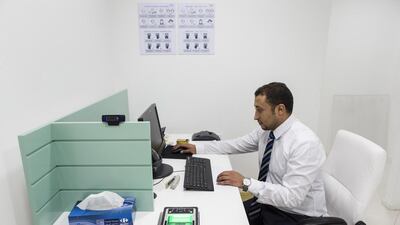Business travellers to Saudi Arabia will be able to pass through immigration in the kingdom more quickly by being fingerprinted before they leave.
Three centres in Abu Dhabi, Dubai and Sharjah will now collect fingerprint and facial scans of Saudi visa applicants along with their passport scans.
It comes ahead of this year’s Haj pilgrimage, which is expected to draw around 2 million pilgrims.
The service from the visa processing company VFS TasHeel costs an additional Dh17 and takes just five minutes, according to the company.
It will also be available to Haj and Umrah pilgrims.
The biometrics data collection service is expected to reduce the wait time for business travellers at the kingdom’s border posts.
Children under 12 years and people above 70 years are exempt from the scan.
Next month it plans to roll out the facility in Australia, Brunei, Sweden and Germany. Egypt and Pakistan are expected to follow after Ramadan.
“It is to make sure the same person who has applied for the visa is travelling and helps in processing the visa,” said Asif Muhammed Delvi, the assistant vice president at VFS TasHeel International. “It would also make it faster to go through the immigration process at the borders.”
The immigration process without pre-screening could be around a couple of hours for travellers, including those on business.
VFS TasHeel’s three UAE centres have a combined capacity to process 3,800 biometric applications a day.
“Unless we see a surge in visa applications, we have no plans to increase the number of centres in the UAE,” Mr Delvi said.
During peak seasons, which includes Haj, his company processes 55,000 visa applications per month, up from 22,000 a month on average, across its UAE centres.
While VFS TasHeel would collect the biometrics data, it would not store or process them in its systems. Saudi Arabia started gathering the information from visitors in 2010. The United Kingdom and the United States are among countries that also require biometric data such as iris scans.
VFA TasHeel introduced the facility in Bahrain in March and subsequently in Japan, Switzerland, South Korea and the Netherlands. The company has approval to process Saudi visas in 33 countries.
Saudi Arabia is ramping up its infrastructure to meet the demands of a fast-growing population and economy.
Projects include Riyadh’s King Khaled International Airport expansion that will increase its capacity to 35 million passengers a year by 2018 from about 17 million now. It will also be linked to the city’s Metro railway system. The kingdom is also expanding the capacity of Grand Mosque in Makkah to accommodate 2 million pilgrims.
Last year, 16.7 million tourists visited the kingdom, a rise of 10 per cent.
VFS TasHeel says it handles 1 million visa applications a year from Egypt, the top source market in the region. It is followed by Pakistan, Indonesia, Jordan and the UAE.
VFS TasHeel is a two-year-old joint venture between the Swiss travel group Kuoni and Saudi Arabia’s TasHeel.
ssahoo@thenational.ae
Follow us on Twitter @Ind_Insights

